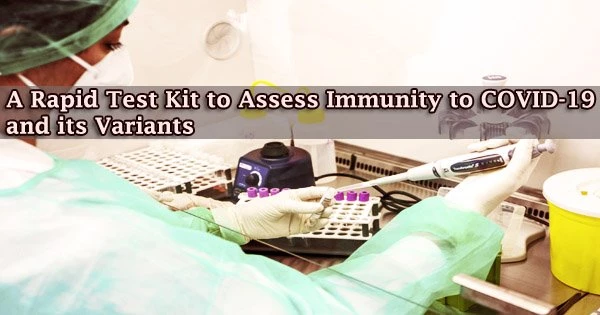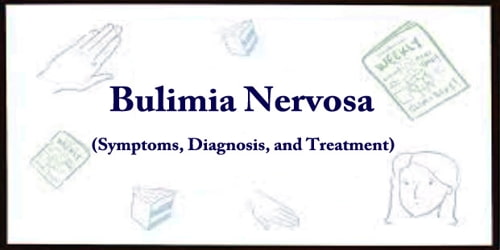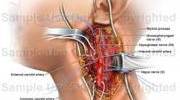A quick test kit that determines whether a person is immune to COVID-19 and its variants based on the antibodies found in a blood sample has been created by a team of researchers from Nanyang Technological University, Singapore (NTU Singapore) and the Singapore-MIT Alliance for Research and Technology (SMART), the research enterprise of MIT in Singapore.
This quick point-of-care test kit is a serology test that detects antibodies produced by the patient, in contrast to ART test kits that look for the presence of viral proteins produced during a COVID-19 infection to identify if a person is infected. Unlike traditional laboratory testing, which needs a drop of blood and takes 24 to 72 hours to provide findings, this method only needs a drop of blood and takes 10 minutes.
The test kit quickly adapts to new varieties of concern and other diseases in the future. It identifies the levels of neutralizing antibodies against SARS-COV-2, the virus that causes COVID-19, and its variants such as Delta and Omicron.
The test kit is inexpensive, quick, and has up to 93% accuracy. It uses a paper-based assay that is coated with chemicals that bind to antibodies in the blood sample. It opens the door to individualized vaccination regimens in which individuals only receive initial immunizations and booster doses when needed, based on the individual’s variation in antibody levels and immunological response.
The findings were published in the scientific journal Microbiology Spectrum by the joint team led by SMART’s Antimicrobial Resistance (AMR) Interdisciplinary Research Group (IRG) and NTU’s School of Biological Sciences, in collaboration with Singapore’s National University Hospital (NUH) and National Centre for Infectious Diseases (NCID), and Massachusetts Institute of Technology (MIT).
The project is supported by the Campus for Research Excellence and Technological Enterprise (CREATE) program of the National Research Foundation (NRF) Singapore. Additionally, the National Health Innovation Centre (NHIC) and National Medical Research Council (NMRC) of Singapore both provide financing for it through their respective COVID-19 Research Funds and COVID-19 Gap Funding Grants.
Fast and accurate tests to overcome challenges
Governments and healthcare organizations can better manage their limited vaccine resources and handle vaccine reluctance by having access to accurate and quick serology tests. This is especially true when it comes to repeated booster doses.
In order to combat the COVID-19 pandemic, vaccination has been a key component of public health initiatives. As of September 9, 2022, 12.6 billion doses had been administered across 184 countries. According to a World Health Organization (WHO) analysis, vaccines prevented an estimated 19.8 million deaths worldwide by reducing the COVID-19 death toll by 63% in the first year of their implementation.
Over the course of the pandemic, several large studies have shown that NAb levels against the dominant variant at the time of the study are a reliable indicator of protection from infection. Some segments of the population have low tolerance for risk of infection. The test kit we developed can provide valuable, individualised information about how quickly or how slowly a person’s antibodies levels have fallen, allowing them to stay informed of their health and, whenever required, get a necessary booster dose to protect themselves.
Professor Peter Preiser
In Singapore, the COVID-19 vaccines were thought to have avoided 8,000 fatalities during the Delta variant wave in 2021, in addition to an estimated 33,000 severe cases and 112,000 hospitalizations. This estimate came from the Ministry of Health (MOH) in February 2022.
The protection provided by currently available vaccines, however, is demonstrated to steadily drop after three months, with varied degrees of reduction among individuals, according to a clinical investigation conducted by the collaborative research team.
The results of the study revealed that, three months after receiving a booster shot, the neutralizing antibody (NAb) response against wild-type and Delta remained high at medians of 91.8%, while medians against Beta and Gamma had fallen to 82.7 and for Omicron, a significant drop to 70.7%, down from 92.9%.
The problem of using mRNA vaccines developed based on the wildtype virus to boost immunity has been made worse by the emergence of novel variants with much higher transmissibility than the wild-type virus, such as Delta and Omicron, especially since some current vaccines are showing reduced protection against these novel variants of concern (VoC).
The challenge of implementing a mass vaccination strategy to develop herd immunity is further exacerbated by the persistence of vaccine hesitancy among specific subsets of the population, where people are reluctant to receive the vaccine or booster shots out of fear of negative effects.
An approach that delivers booster doses to people who are judged to be more at risk, such as healthcare workers and the elderly, may be more effective in addressing vaccine reluctance and the efficacy of vaccination against new variations.
Healthcare professionals must be able to swiftly assess each patient’s level of NAb response to variations using an accessible point-of-care test kit in clinics, hospitals, or immunization facilities for a personalized approach to be effective.
Corresponding author of the paper, Professor Peter Preiser, Co-Lead Principal Investigator at SMART AMR and Associate Vice President for Biomedical and Life Sciences at NTU Singapore said:
“Our team’s work in the development of a rapid test kit has given us valuable insights into vaccine effectiveness and protection longevity. Our study proves that our new test kit can be a powerful tool, allowing healthcare organizations to screen people and determine their vaccination needs, especially against the current and upcoming variants. This will help allay some people’s fears that they will be ‘over-vaccinated with a booster’, since the results will inform them accurately if they are well-protected against COVID-19 or not.”
Dr. Hadley Sikes, SMART AMR Principal Investigator, Associate Professor at MIT and co-corresponding author of the paper added, “Over the course of the pandemic, several large studies have shown that NAb levels against the dominant variant at the time of the study are a reliable indicator of protection from infection. Some segments of the population have low tolerance for risk of infection.”
“The test kit we developed can provide valuable, individualised information about how quickly or how slowly a person’s antibodies levels have fallen, allowing them to stay informed of their health and, whenever required, get a necessary booster dose to protect themselves.”
Proven effectiveness of antibody test kit
The team’s research report details a clinical trial of the cellulose pulled-down virus neutralisation test kit (cpVNT), a blood test that measures neutralizing antibodies’ ability to protect against SARS-CoV-2 and its variations.
The test kit is an effective, inexpensive, and simple-to-use tool that will enable large-scale testing and can be widely deployed anywhere as part of a customized vaccination strategy. It can evaluate an individual’s neutralizing antibody level against a specific COVID-19 variant within 10 minutes with a drop of finger prick blood.
The test discloses a person’s level of neutralizing antibodies, which can then help a person decide whether to take a booster shot and how careful they should be about potential transmission before taking it.
It allows for extensive testing of vulnerable populations, including the elderly, without the need for specialized laboratory equipment and can be carried out by a layperson without medical training.
Co-first author of the paper and former Postdoctoral Associate at SMART AMR Hoi Lok Cheng said, “This is an exciting breakthrough for us, and a continuation of our long-running work to develop efficient, low-cost, and easy-to-use NAb tests to combat the COVID-19 pandemic. As a quantitative test that can detect NAb levels specific to key variants such as Delta and Omicron, the cpVNT has given us valuable insights into the effectiveness of various vaccines vis-à-vis variants of concern. This test kit will also prove integral to a more personalised vaccination approach that will benefit higher-risk individuals such as the elderly and healthcare workers.”
“Individuals from these communities can have their immuno-protective profile assessed on a regular basis via the cpVNT, allowing them to know when a booster dose may be appropriate or necessary. Furthermore, this test can be easily adapted to test for novel SARS-CoV-2 variants that may emerge in the future.”
The SMART team’s body of work from previous years is built upon in this study. The group outlined the framework for a cellulose-based vertical-flow test to identify neutralizing antibodies against SARS-CoV-2 in an article that was published in the medical and public health journal Communications Medicine.
In a separate study, the test’s performance was compared favorably to that of other approaches including the surrogate viral neutralization test (sVNT) and pseudovirus-based virus neutralization test (pVNT) in the prestigious chemical engineering journal Bioengineering and Translational Medicine.
The scientists determined that a whole-blood test like the cpVNT might be just as useful as a plasma-only test using clinical samples (containing both whole blood and plasma) and the World Health Organization International Standard and Reference Panel for anti-SARS-CoV-2 antibody.
The cpVNT is more resource-efficient and less invasive because plasma- or serum-based diagnostics demand laboratory equipment to process the blood sample and greater blood sample requirements.
Furthermore, the cpVNT’s success shows that neutralizing antibodies and point-of-care testing can be successfully conducted using this format and protocol, opening the door for further invention and development of this platform to treat various diseases.
The test kit is now undergoing additional development to fulfill the required production requirements and regulatory certifications for general use. The SMART team that created the tests also created Thrixen, a biotech firm that is turning the test into a product that is ready for the market.
Together with scientists from NTU, who assisted in the design of the trial, provided the study’s particular reagent supplies, and collected clinical sample collections, key aspects of the quick test were developed at SMART AMR. While MIT oversaw the project, NUH and NCID had supplied clinical sample materials and offered advice on how to apply the test medically.
















